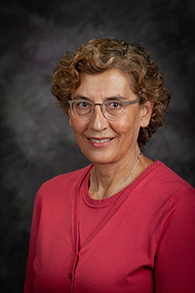Caterina Scoglio | Kansas State University
Caterina Scoglio | Kansas State University
Caterina Scoglio, professor in the Mike Wiegers Department of Electrical and Computer Engineering at Kansas State University, has received a U.S. Department of Agriculture – Research Education and Economics grant to study long-distance dispersal and disease spread of six model hosts and pathogens.This is a collaborative effort with Lee Cohnstaedt, research entomologist at Foreign Arthropod Borne Animal Disease Research, U.S. Department of Agriculture, Manhattan.
Scoglio is responsible for a $580,000 portion of the $2.5 million project, "US-UK Collab: Long-Distance Dispersal and Disease Spread Under Increased Ecological Complexity," led by Oregon State's Christopher Mundt. The project is sponsored by the multiagency program Ecology and Evolution of Infectious Diseases.
Much of the current theory regarding epidemic spread is anchored in simplified conditions of single outbreak sites, uniform hosts and deterministic epidemic responses. This project will study multiple outbreaks, complex host communities and different sources of stochastic transmission during the spatiotemporal spread of epidemics caused by pathogens with long-distance dispersal.
The project aims to test four hypotheses related to the topic of epidemic spread, including: the effects of multiple sources of epidemic outbreak, the conditions for spillover — the transfer of pathogen from one population to another, the sources and effects of uncertainty in pathogen transmission and the similarities of several long-distance dispersal disease systems.
"Our group will study mathematical and computational models for West Nile virus transmission that can generate a unifying framework across long-distance disposal diseases incorporating diverse hosts, pathogens and environments evolving with time," Scoglio said. "We will also develop robust predictions of pathogen transmission, requiring an understanding of the effects and sources of uncertainty."
Original source can be found here.

 Alerts Sign-up
Alerts Sign-up